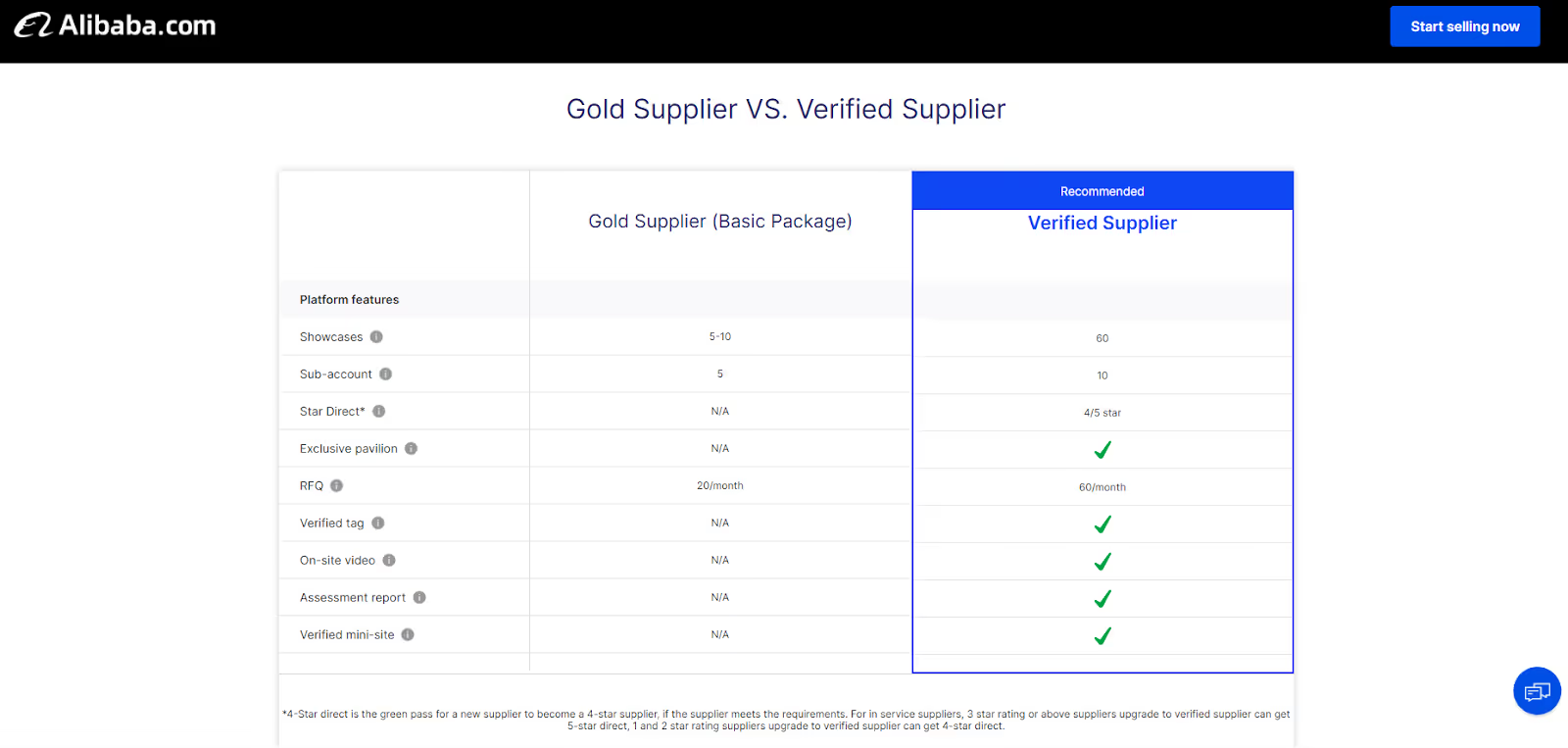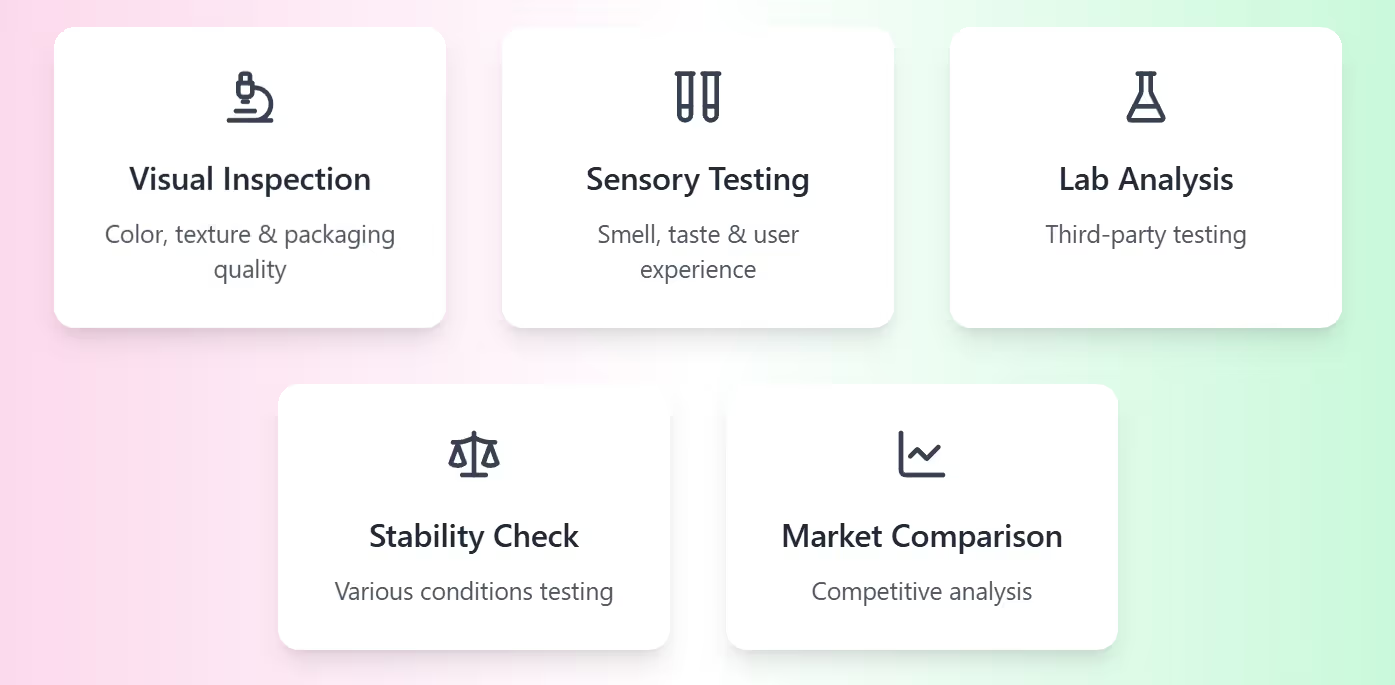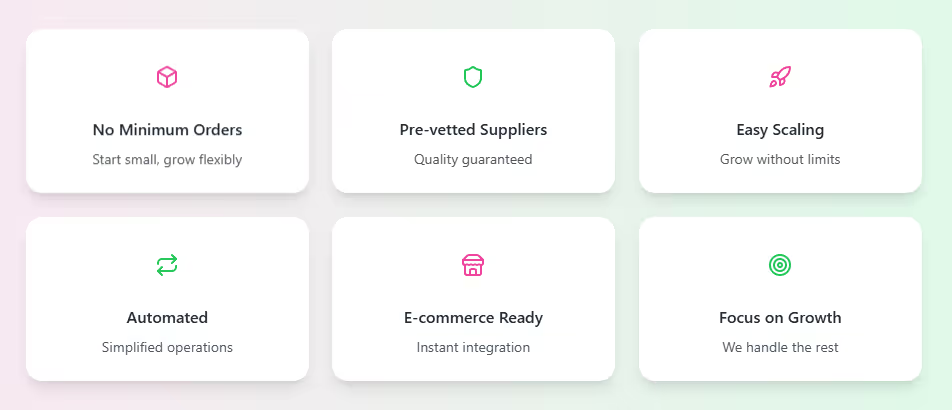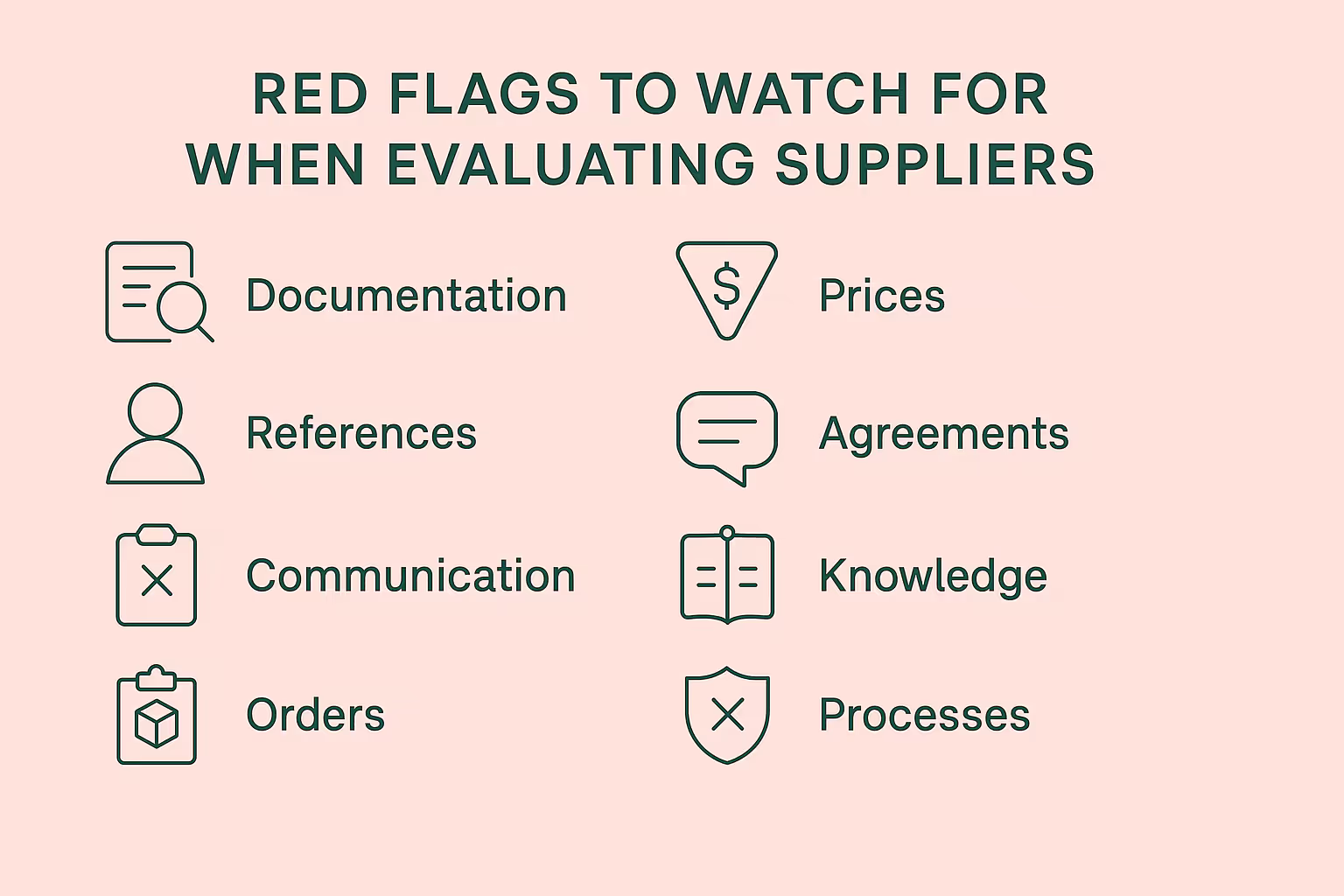%20(1).avif)
The organic and holistic product market is rapidly growing, with the global organic beauty market alone projected to reach $22 billion by 2024. Consumers are increasingly prioritizing natural ingredients and sustainable practices in their wellness choices.
For entrepreneurs entering the organic and holistic product space, knowing how to find reliable suppliers of organic and holistic products is crucial.
Strong supplier partnerships ensure product quality, consistency, and authenticity—essential elements that wellness-conscious customers expect from trusted brands.
4 Different Channels to Find Reliable Organic and Holistic Product Suppliers
Finding trustworthy organic and holistic product suppliers is essential for business success. These four proven sourcing channels will connect you with qualified partners while minimizing costly mistakes.
Industry Trade Shows and Expos
Trade shows remain one of the most effective ways to connect with reputable suppliers face-to-face. Key events include:
- Natural Products Expo West and East
- Supply Side West
- Vitafoods Europe and Asia
- BioFach (world's largest organic trade fair)
- CHFA (Canadian Health Food Association) shows
These events allow you to:
- Speak directly with supplier representatives
- Sample products firsthand
- Compare multiple suppliers in one location
- Network with other brands to gather recommendations
Pro tip: Schedule meetings with potential suppliers before the trade show begins. The best suppliers often have packed schedules during these events, and pre-arranged meetings ensure you get quality time to discuss your needs.
B2B Supplier Directories and Platforms
Several online platforms specialize in connecting brands with verified suppliers:

General B2B Platforms:
- Finding a supplier on Alibaba through the Verified Suppliers program (look for Gold Suppliers with Trade Assurance)
- ThomasNet for North American manufacturers
- EC21 for international suppliers
Organic/Natural-Focused Platforms:
- Organic-Bio.com
- Organic Wholesale Database
- RangeMe (particularly strong for retail-ready products)
When using these platforms, filter for suppliers that have third-party verification and strong buyer reviews. Most platforms allow you to request samples and quotes directly through their systems.
Industry Associations and Certification Bodies
Organization memberships can provide access to pre-vetted suppliers:
- Organic Trade Association (OTA)
- American Herbal Products Association
- Natural Products Association
- The Council for Responsible Nutrition
- International Federation of Organic Agriculture Movements (IFOAM)
Many of these organizations maintain member directories that include suppliers who have already met certain standards. This pre-screening can save you significant time in the vetting process.
Conducting Due Diligence on Potential Suppliers

Once you've identified promising suppliers, thorough due diligence is essential before committing to any partnership.
Sample Assessment Protocol
Request product samples from multiple suppliers and conduct a systematic assessment:
- Visual inspection: Check for consistency in color, texture, and packaging quality
- Sensory testing: Evaluate smell, taste (if applicable), and user experience
- Professional analysis: Consider sending samples to third-party labs for testing
- Stability testing: Store samples in various conditions to assess shelf stability
- Competitive comparison: Test against market-leading products in your category
Production Facility Verification
For significant partnerships, visiting the production facility provides invaluable insights:
- Observe cleanliness and organization
- Meet the quality control team
- Verify equipment capabilities and capacity
- Confirm that certifications are displayed and current
- Assess worker conditions and safety protocols
If an in-person visit isn't feasible, request a virtual tour or detailed photographs of the facility. Some suppliers also offer third-party audit reports that can substitute for a personal visit.
Supply Chain Resilience Assessment
Reliable suppliers have robust systems to ensure consistent delivery:
- Multiple sourcing options for key ingredients
- Inventory management systems
- Disaster recovery plans
- Seasonal planning for agricultural ingredients
- Transportation redundancies
Building Successful Supplier Relationships
Finding suppliers is just the beginning—building productive relationships ensures long-term success.
Communication Protocols
Establish clear communication channels from the start:
- Designated points of contact on both sides
- Regular check-in meetings (weekly or monthly)
- Shared documents for specifications and requirements
- Emergency contact procedures
- Feedback mechanisms for continuous improvement
Documentation of all communications prevents misunderstandings and creates accountability.
Contracts and Agreements
Work with a lawyer experienced in the natural products industry to develop agreements that address the following:
- Product specifications and acceptable variances
- Pricing structures and volume discounts
- Minimum order quantities
- Lead times and delivery schedules
- Quality control responsibilities
- Intellectual property protection
- Non-disclosure provisions
- Compliance requirements
Well-crafted agreements protect both parties and clarify expectations. The best relationships are built on mutual benefit rather than one-sided terms.
Scaling Considerations
As your brand grows, supplier capabilities become increasingly important:
- Production capacity expansion possibilities
- Ability to develop new formulations
- Packaging customization options
- Inventory management for larger orders
- International shipping and compliance
- EDI (Electronic Data Interchange) capabilities
Working with Specialized Fulfillment Partners

For many brands, particularly startups and growing companies, working with specialized fulfillment partners offers significant advantages over managing multiple supplier relationships.
Platforms like Supliful provide integrated solutions that combine supplier vetting, product development, and fulfillment services. This approach:
- Reduces capital requirements (no minimum order quantities)
- Eliminates inventory management headaches
- Ensures consistent quality through pre-vetted suppliers
- Simplifies scaling and product line expansion
- Provides built-in e-commerce integration
These fulfillment solutions are particularly valuable for entrepreneurs who want to focus on brand-building and marketing rather than supply chain management.
Red Flags to Watch For When Evaluating Suppliers

Even with diligent research, it's important to recognize warning signs:
- Reluctance to provide documentation or testing results
- Prices significantly below market average
- Inability to provide references from current clients
- Unwillingness to sign quality agreements
- Lack of knowledge about regulatory requirements
- Poor communication or delayed responses
- Pressure to place large orders before establishing a relationship
- No formal quality control processes
Trust your instincts—if something feels questionable, it's worth investigating further or moving on to other options.
Common Pitfalls in Organic & Holistic Supplier Selection
Many new brands make predictable mistakes when selecting suppliers:
Prioritizing Price Over Quality
Low prices often reflect cutting corners in ingredient sourcing, testing, or manufacturing practices. In the organic and holistic space, these compromises quickly translate to customer dissatisfaction and potential safety issues.
Solution: Calculate the true cost of products by factoring in consistency, reliability, customer satisfaction, and potential reputation damage from quality issues.
Insufficient Sample Testing
Making decisions based on a single sample without thorough testing can lead to surprises when full production begins.
Solution: Request multiple samples from different production batches and test them across various conditions and timeframes.
Overlooking Minimum Order Quantities
Some suppliers require substantial minimum orders that can strain cash flow for new brands.
Solution: Negotiate graduated minimum order quantities that increase as your business grows, or partner with fulfillment services that aggregate orders across multiple brands.
Neglecting Compliance Requirements
Different markets have varying regulatory requirements for organic and holistic products.
Solution: Work with suppliers experienced in your target markets who understand the specific compliance needs for those regions.
Launching Your Organic & Holistic Product Line
Once you've secured reliable suppliers, focus on creating a cohesive product offering that resonates with your target market. Consider starting with the most popular wellness products to establish market traction before expanding into more specialized offerings.
For brands looking to minimize upfront investment and complexity, some platforms offer pre-formulated, ready-to-brand products from vetted suppliers. This approach allows you to launch quickly while ensuring product quality and regulatory compliance.
Insider’s Insight: The Edge of Third-Party Audits
A powerful but often overlooked strategy for vetting suppliers is requesting third-party audit reports.
These independent audits provide an unbiased review of a supplier's manufacturing processes, regulatory compliance, and sustainability practices. This ensures their claims align with your quality and ethical standards.
Third-party audits offer transparency and help mitigate risks, especially when dealing with large orders or long-term partnerships. By relying on objective evaluations, you can confidently choose suppliers that meet your brand’s high expectations.
Building a Sustainable Supply Chain for Long-Term Success
Successful organic and holistic brands treat supplier relationships as strategic partnerships. By carefully selecting reliable suppliers and fostering strong connections, you lay the foundation for consistent product quality and sustainable growth.
In the wellness space, your suppliers are an extension of your brand’s promise. Choose partners who share your values and commitment to excellence.
Define your quality standards, conduct thorough research, and perform due diligence before committing—this investment will benefit your customers and business.
FAQ
Related blogs

Dynamic Pricing Calculator: Optimize Margins and Sell Smarter With Every Click
.avif)
Safety Stock Calculator: Instantly Find the Right Buffer Stock for Any Product
.avif)
Cart Abandonment Rate Calculator: Understanding and Maximizing Your E-Commerce Conversions
.avif)

